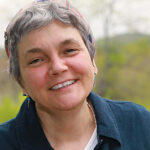This is an excerpt from Christian McEwen’s In Praise of Listening forthcoming with Bauhan Publishing (October 2023).
In a poem by Patricia Lee Lewis, “While talking with her on the phone,” the narrator makes a pasta supper while someone weeps long distance down the phone. She fills the cast iron pot with water, adds the salt, lights the burner, and settles the pot on the stove, all while listening closely to the desolate person at the other end:
[. . .] I say I love you, tearing
cellophane. You are perfect in my
eyes. Did you dream last night?
The pasta sticks. And when the woman
in your dream picked up the knife?
The narrator barely speaks; she asks only a couple of questions. And yet her voice is enough to soothe and steady the other person—her daughter, perhaps, or sister or beloved friend.
I add some virgin olive oil. She isn’t
crying now. She says, I think I’d better cut
it off with him. I’m looking for the
colander, the one with larger holes.
Steam clings to windows. Yes, I say,
and take the grater from its nail.
Is the speaker of the poem really listening?
Yes, I’d answer. Yes. Eckhart Tolle writes of the power of centering oneself “in one’s own inner energy field, sensing the inner body,” even while listening to someone else. And that is certainly what is being modeled here. The narrator goes on cooking—first one task and then another—but she also remains attentive to the distant speaker. A gentle, trusting energy connects the two of them. And there’s no question that the consolation works.
If William James is right, and what we call our experience “is almost entirely determined by our habits of attention,” then the wise or generous listener is someone who is able to set aside their own preoccupations—at least momentarily—and extend that gift of uninterrupted focus. A number of people have written well about this, including the psychotherapist Abraham Maslow and the British doctor Rachel Pinney. Maslow, for example, encourages us to corral or “bracket” our own thoughts for the duration of a talk, resulting (if all goes well) in what he calls real listening:
To listen [. . .] without presupposing, classifying, improving, controverting, evaluating, approving or disapproving, without dueling what is being said, without rehearsing the rebuttal in advance, without free-associating to portions of what is being said, so that succeeding portions are not heard at all.
Pinney, too, advises us to gather ourselves and pause. In her view, one cannot listen deeply to a speaker, and at the same time marshal one’s own forces in order to respond. Such “double attention” is doomed to fail. What she calls creative listening has at its heart the instruction “to listen empty,” grounding oneself in one’s own calm presence without trying to judge or fix or interrogate what is being said.
The marvel is that if someone is allowed the time they need to do just this—time to do their own naming and explaining—they will often talk their way into their own solution, just like the woman in the poem. The mind alone will not suffice for this. As Leslie Jamison writes in The Empathy Exams, “The Chinese character for listen is [. . .] a structure of many parts: the characters for ears and eyes, a horizontal line that signifies undivided attention, the swoop and teardrops of the heart.”
A Writing Exercise
Print out copies of “While talking to her on the phone” by Patricia Lee Lewis, and read the poem aloud to your class. Allow everyone time to read it through for themselves, and then use it as a basis for discussion. Does anyone have a story about trying to complete some ordinary task while also doing their best to listen, either in person or on the phone? What was that like? And how might it feel to be the other person? She is reaching out to somebody she loves—her mother or sister perhaps—talking, crying, sharing a charged image from a dream. Do you think that she feels truly heard and understood? Why or why not?
This lesson will work best with teenagers (8th to 12th grade students), not least because of its emphasis on relationships. Depending on the time available, you might want to introduce them to the 19th century philosopher William James, explore the etymology of “attention” (from the Latin attendere, meaning “to stretch towards”), or talk through the quotes from Abraham Maslow and Rachel Pinney so that everyone has some understanding of “real” or “creative” listening. This too can be a rich source for their own writing.
Writing Prompts
- Write a poem or story that centers around the act of listening and being heard.
- Write about its opposite: an example of not feeling heard or understood.
- Introduce the term “halversation” (hearing only one half of a conversation, as we do here), and ask people to rewrite the Patricia Lee Lewis poem in the form of a play, reconstructing the missing dialogue.
- Choose one of the words or phrases used by Maslow or Pinney (double attention, over-talker, listen empty, etc.) and ask your students to explore it in relation to themselves.
- Reproduce the Chinese character for “listen,” and explain what the different brush-strokes mean. Ask everyone to make a copy, and then to draw or paint their own image ofattentive listening.
While talking with her on the phone
by Patricia Lee LewisI fill the cast iron pot with water
Reprinted with permission from the author.
from the well, listen to her weep
and add the salt. She tells me
how she cannot leave her room.
I light the burner, set the pot,
the lid. I say I love you, tearing
cellophane. You are perfect in my
eyes. Did you dream last night?
The pasta sticks. And when the woman
in your dream picked up the knife?
I add some virgin oil oil. She isn’t
crying now. She says, I think I’d better cut
it off with him. I’m looking for the
colander, the one with larger holes.
Steam clings to windows. Yes, I say,
and take the grater from its nail.
The parmesan is sweet and makes
a fragrant mountain on the cutting board.
Read more from this series:
• “Small Sounds of the Past“
• “Listening to the Work“
• “Willing to Listen“
Footnotes:
Patricia Lee Lewis: “While talking with her on the phone,” High Lonesome (Levellers Press, 2011).
“The inner energy field. . .” Eckhardt Tolle, The Power of Now: A Guide to Spiritual Enlightenment (New World Library, 1999), p. 26.
“Is almost entirely determined. . .” William James, Chapter 11, The Principles of Psychology (1890).
“To listen . . . without presupposing, classifying, improving . . .” Abraham Maslow.
Creative listening: Rachel Pinney, Creative Listening (Creative Listening, Ltd. 1983).
“The Chinese character for listen is . . .” Leslie Jamison, The Empathy Exams: Essays, (Graywolf Press, 2014), p.21.
Christian McEwen is a freelance writer and workshop leader originally from the U.K. She is the author of several books, including World Enough & Time: On Creativity and Slowing Down, now in its eighth printing. She edited Jo’s Girls: Tomboy Tales of High Adventure; Sparks from the Anvil: the Smith College Poetry Interviews; and, with Mark Statman, The Alphabet of the Trees: A Guide to Nature Writing. Christian has enjoyed residencies at Yaddo, MacDowell, Mesa Refuge, and the Virginia Center for the Creative Arts, and has received a fellowship in playwriting from the Massachusetts Cultural Council. Her new book, In Praise of Listening, will be published in October.




